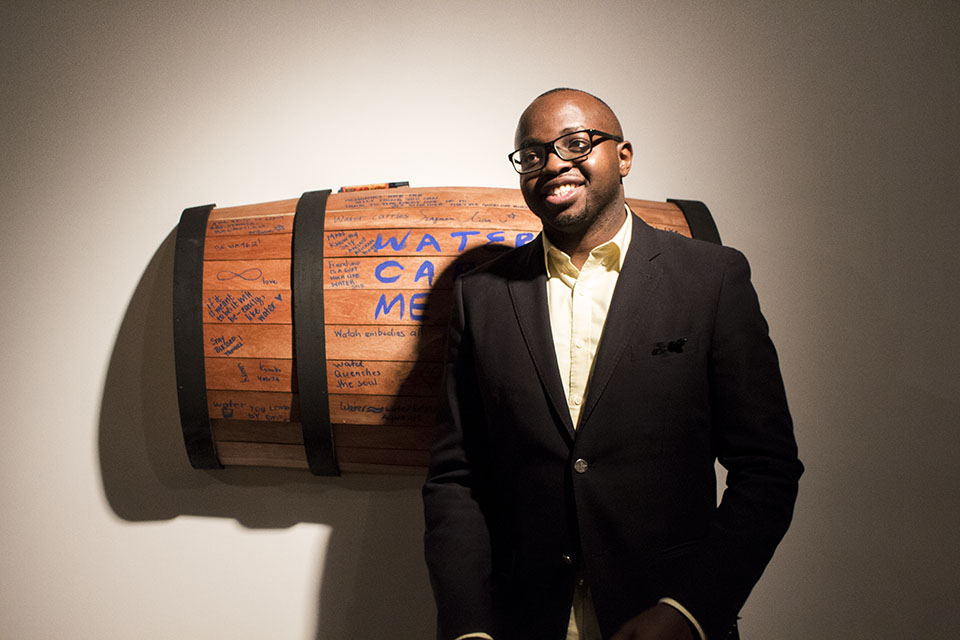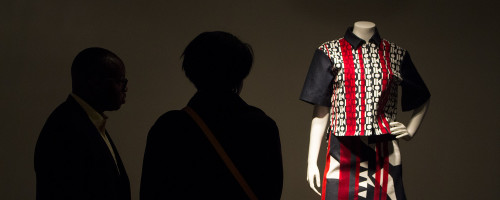Water, for many, is a necessity that sustains life, a powerful weapon that can erode land and is a transformative healing element. For fashion designer Chinedu Ukabam, water is a force that connects the African diaspora from every corner of the globe.
“The African diaspora began with a journey over water,” explains Ukabam, referring to the transatlantic slave trade, which had the lasting effect of spreading Black people from Africa throughout the Caribbean and the Americas, and since then, throughout the world, creating one of the largest diasporas in the world.

The diaspora has become a medley of cultures that come across as expertly sampled remixes of each other. Drum patterns found in soca mirror rhythms found in afrobeats. Food staples like stews and root vegetables are found in cuisines spanning Trinidad, Louisiana, Brazil and Nigeria. New innovations are shared from country to country.
This spread of people diffused elements of West African countries from music and food to religion and fashion through several countries, elements which are now being discovered by the mainstream. But with the fashion world in particular, Ukabam warns of the issues that can arise when elements of African culture become ‘trend’.
Ukabam, who is the co-founder of SUPAFRIK, a blog celebrating Africana art, says the fashion industry is not in the business of style exactly, but rather forecasting or creating trends and then exploiting them for the few months a season lasts.
“The danger with that is that if they latch onto something that’s been around forever in Africa, and they make it trendy, and then announce that the trend is over, it sets a horrible precedent,” says Ukabam, who first started designing under his Chinedesign label in 2003. “How could my culture be over? That’s my culture.”
Ukabam drew on the connections within the African diaspora and its relationship to water for a recent exhibit he curated. As part of Kuumba, a Black History Month festival hosted by Toronto’s Harbourfront Centre, the fashion exhibit “Water Carry Me Go” offered a display of Black culture and talent through a selection of dress designs.
The seven designers featured in the show were tasked with creating a piece around the theme of water, but apart from that, they all had creative licence. The gowns produced featured everything from tangles of blue rope, three-dimensional skirts and geometric prints, to gauzy fabrics, canvas and silk.
The artists used water to highlight a range of topics: femininity, mythology, capturing energy, migration and more. The results were varied, and highlighted the diverse visions and creativity of each designer, going beyond what’s usually thought to be “African”, based on trends.
Gloria Wavamunno, a Uganda-based designer who contributed a feathered garment to the show called “Olwendo Iwa Mazzi”, meaning a welcome drink, which explored water’s movement and flexibility, has noticed how African designs can be generalized.
“African designers are not just about print, we’re designers as much as any designers and we’re trying to make good quality product.”
Wavamunno started her self-titled brand six years ago, during what she calls “the era of the trend of Africa,” but she is hoping for these restrictions to change.
“I feel that we’re trying to push a message beyond just print, because African designers are not just about print, we’re designers as much as any designers and we’re trying to make good quality product.”
With the outfits in “Water Carry Me Go” being constructed with everything from feathers to origami boats, these designers did away with the one-dimensional idea that African fashions are all about prints and patterns.
WavaMunno says she hopes projects like this will ignite conversation. Even if some of the remarks are, “this doesn’t look African,” it will be an opportunity to critically examine that statement.
Ukabam says he is doing what he can to shift the current, not just for Black and African artisans in the fashion world, but also for Black History Month in general.
Throughout February, he says he’d like to see more unique platforms through which to tell our stories – not just as anecdotes from history, but on a continuum.
“Our story begins thousands of years ago, but our story is happening now, and our story is going into the future.”
Photos © Angelyn Francis & Urbanology Magazine




Comments are closed.